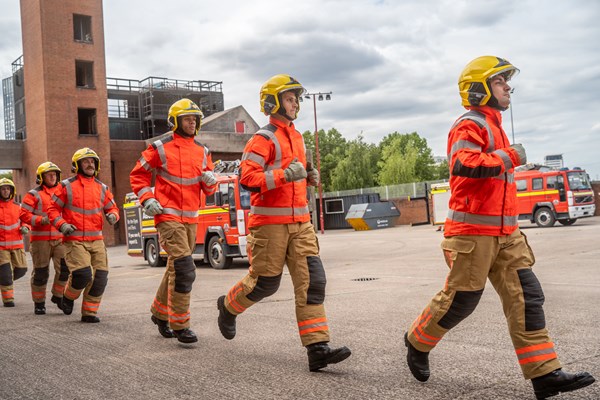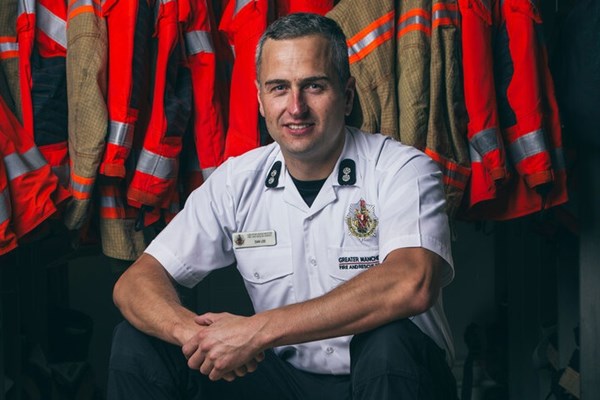
Greater Manchester Fire and Rescue Service unveils revised transformation proposals
Greater Manchester Fire and Rescue Service has unveiled revised proposals to ensure we have a sustainable, efficient and modern fire and rescue service that is focused on keeping communities safe.
The proposed changes to the Programme for Change proposals follow extensive consultation with staff, public and stakeholders and will allow us to deliver a sustainable, affordable, front-line first emergency service.
The recommendations sit alongside improvements we have already made that provide our firefighters with better working conditions and benefit from more family-friendly policies and procedures. We have introduced a new shift system and removed roster reserves to improve work/life balance, changed the annual leave system to give greater flexibility, as well as refurbishing a number of fire stations to improve facilities.
Updated proposals include:
- The current arrangements around the number of firefighters on fire engines will be maintained for this financial year.
- Firefighter numbers will remain at or above May 2017 levels for at least the next financial year.
- Firefighters will see their role around prevention and protection enhanced, in areas around fire safety visits, inspections and enforcement activity. We will allow sufficient time for our firefighters to be adequately trained and equipped to fulfil these duties whilst retaining a number of additional specialist prevention staff to support complex cases.
- We will develop alternative delivery models for volunteering and cadets and continue our Princes Trust work to allow more time to develop future options.
- We will maintain a fleet of 50 fire engines for at least this financial year.
- The fire station mergers will go ahead as planned, which will see the creation of three brand new state-of-the-art fire stations, alongside ongoing investment in stations, including welfare facilities.
- The proposed reduction of 113 non-uniformed roles has now reduced to 60 roles and the service continues to aim for no compulsory redundancies. The service will work with any staff impacted to help them find new positions.
We will also maintain our position as one of the fastest responding fire services nationally. Our average response times will still be more than a minute better than the national average.
In addition, the service will ensure robust plans will be in place to support the improvement of fire safety in the private rented sector, as well as being ready to implement any findings around high rise buildings which come out of the Grenfell fire tragedy.
Our wider proposals will ensure that the service is on a sound financial footing and is able to continue to provide the people of Greater Manchester with the high quality service they expect. Like services across the country, GMFRS has suffered from a decade of austerity and we will continue to lobby central government for a fairer financial settlement for fire and rescue.
The revised proposals will be considered at the meeting of Greater Manchester Combined Authority on Friday 27 September.
Chief Fire Officer Jim Wallace said: “These proposals will ensure that Greater Manchester Fire and Rescue Service continues to keep people safe whilst making sure that it is a sustainable, efficient and modern organisation that is fit for the future.
“We have listened to the feedback we received from the consultation and our engagement with staff and have made changes to the initial proposals where appropriate.
“We have done a lot of work to put the organisation in the best possible position to deliver these necessary changes and I expect to see significant progress over the coming months to further improve a fire and rescue service that is already respected across Greater Manchester.
“These proposals will provide our firefighters with improved working conditions, modern facilities and better training and equipment. Firefighters will be supported by a fire and rescue service that has a culture of trust, respect and accountability.”
Mayor of Greater Manchester Andy Burnham said: “The Deputy Mayor and I have been listening closely to Fire Service staff and communities and have tried to respond to the concerns that they have raised. Greater Manchester has some of the fastest response times in the country and we will always do everything we can to maintain that.
“This is difficult in what remains a challenging time for public services but we are doing everything we can to ensure safe fire cover for all our communities.
“But there is only so much we can do - I call on Government to recognise that their fire cuts have gone too far and begin fairly funding our Fire Service.”
Article Published: 20/09/2019 14:17 PM



